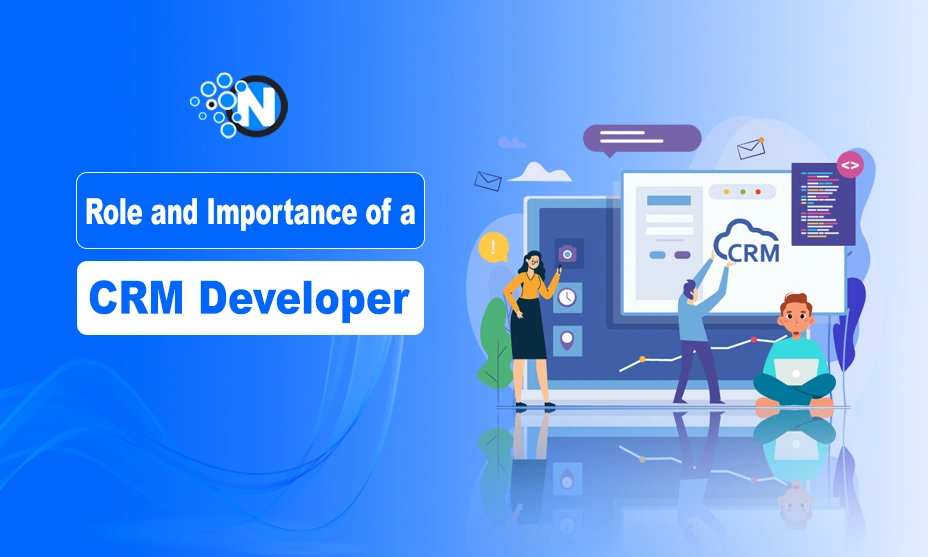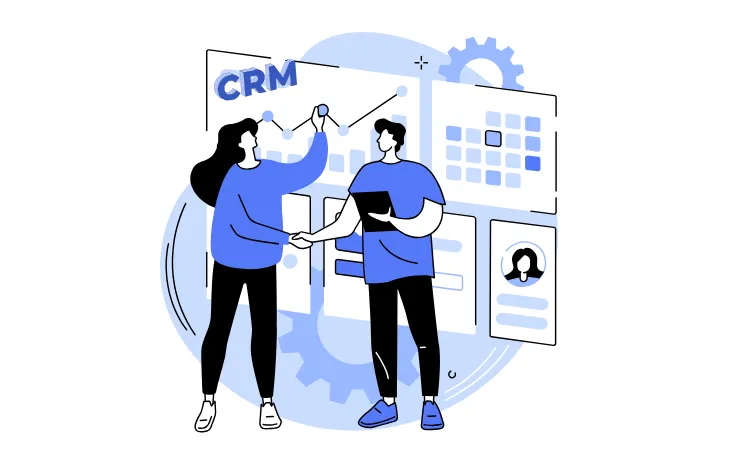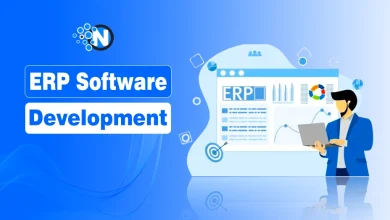The Role and Importance of a CRM Developer – Your Guide to Success

In the modern business world, strong customer relationships are paramount. Whether you are a small business or a big agency, managing customer relationships efficiently is important for growth. One of the most effective systems for managing customer relationships is the Customer Relationship Management (CRM) software program. But who builds those complicated systems?
The answer is a CRM Developer.
In this blog post, I will explore what CRM Developers do, why they’ll be essential for your enterprise, and how they contribute to the fulfillment of CRM systems.
Let’s start
What is a CRM Developer?
A CRM Developer is a specialized software developer skilled in designing, customizing, and implementing CRM systems for businesses. CRM systems help companies prepare, automate, and synchronize all customer communication, which includes sales, advertising and marketing, customer service, and technical help. CRM Developers work with famous systems like Salesforce, Microsoft Dynamics, HubSpot, Zoho, and custom-constructed solutions to make bigger systems that cater to a company’s unique needs.
These developers are necessary in ensuring the CRM system is customized to an organization’s techniques and requirements. They are professionals in numerous programming languages, including Java, C#, Python, and JavaScript, and are proficient in database management and integration techniques.

Why is a CRM Developer Important?
In this competitive marketplace, teams rely carefully on customer data to gain insights. CRM systems are designed to assist organizations in enhancing their interactions with clients, boosting earnings, optimizing marketing strategies, and ensuring extraordinary customer support. However, CRM systems are not one-size-fits-all answers. That’s where CRM Developers come in.
Here are a few reasons why CRM Developers are essential:
1. Customization and Personalization
Every business operates differently, and what works for one agency might not work for another. A CRM Developer customizes the CRM system to meet specific company needs. By tailoring the CRM platform to an agency’s strategies, workflows, and goals, a CRM Developer ensures that the system aligns with company objectives, making it easier for employees to use and growing its effectiveness.
For instance, CRM Developers would configure the system to tune specific patron information factors and create custom workflows for income or customer support teams. Customization ensures that businesses can leverage the full capacity of the CRM platform.
2. Streamlining Business Processes
A CRM system isn’t just about storing customer information. It is set to automate and streamline diverse business strategies, including lead management, customer support, getting predictions, and advertising automation. CRM Developers help develop techniques that last and increase performance.
CRM Developers ensure the data flows seamlessly through different business operations, marketing strategies, accounting software programs, and eCommerce websites. This connectivity prevents records silos and improves collaboration throughout departments.
3. Integration with Third-Party Tools
These days, agencies use multiple tools and software programs to integrate unique factors into their operations. A CRM system must work nicely with those tools for optimum overall performance. A professional CRM Developer can integrate the CRM system with different 3rd-party systems like e-mail marketing, social media systems, ERP systems, and data analytics tools.
For example, a CRM Developer might also combine an e-mail advertising and marketing system with a CRM system to automate email campaigns based on buyer behaviour.
4. Ensuring Scalability
As businesses develop, their CRM systems must expand with them. A CRM Developer guarantees that the CRM tool is scalable, which means it can handle elevated data, users, and additional complicated techniques. Whether your business expands locally or across the world, your CRM system should assist in the increasing number of consumer interactions. CRM Developers work on making the tool flexible and adaptable to future business needs.
5. Troubleshooting and Optimization
CRM Developers are responsible for renovating CRM software on an ongoing basis. This includes troubleshooting problems, optimizing performance, solving bugs, and ensuring that the system runs smoothly. A nicely maintained CRM tool ensures that employees can access customer statistics immediately, which is crucial for customer satisfaction.
They are also responsible for upgrading the CRM system with advanced features and security patches. Regular updates keep the CRM system consistent from potential threats, ensuring the safety of touchy client information.
Skills and Expertise of a CRM Developer
CRM development needs different technical and non-technical talents. Here are some of the key skills and information that CRM Developers must have:

1. Proficiency in CRM Platforms
CRM Developers are generally well-versed in a single or more of the principal CRM software. Salesforce, Microsoft Dynamics, and HubSpot are some of the most famous CRM solutions. A CRM Developer has to develop, customize, and keep those systems based on business needs. Each CRM platform has its own set of features, plugins, and development environments; an expert CRM developer can be familiar with these elements.
2. Programming Languages
CRM Developers should have strong programming abilities in language alongside:
- JavaScript, HTML, and CSS for front-give-up improvement and customization of CRM consumer interfaces.
- Apex, Visualforce (Salesforce), or C# (Microsoft Dynamics) for again-give-up development.
- Python, Java, and PHP for building integrations with 1/three-party programs or custom-constructed CRM solutions.
3. Database Management and SQL
Since CRMs address large quantities of consumer data, a CRM Developer wants to recognize database control. Knowledge of SQL, NoSQL databases, and cloud databases (like AWS, Microsoft Azure, or Google Cloud) is vital. A CRM Developer must also recognize how to maintain, retrieve, and control massive datasets successfully.
4. Integration Expertise
CRM Developers need to be professional in integrating precise software application structures. For instance, integrating CRM with ERP systems, accounting software programs, marketing automation tools, and customer service applications requires facts in APIs (Application Programming Interfaces) and internet services.
5. Problem-Solving Skills
CRM Developers must also be fantastic problem solvers. From dealing with bugs to troubleshooting issues, their capability to assume seriously and discover solutions is crucial in keeping the CRM system working smoothly.
How CRM Developers Drive Business Growth
The role of a CRM Developer goes beyond truly coding and implementing software. Their work has a direct impact on business growth. By optimizing the CRM tool for an enterprise’s specific goals, CRM Developers allow businesses to function extra efficiently, enhance customer trust, and boost sales. Here are a few ways CRM developers contribute to business growth:
- Increased Customer Retention: A CRM system lets businesses stay connected with their clients, offering personalized services and focused advertising and advertising campaigns, which results in better customer retention expenses.
- Enhanced Sales Performance: CRM developers help teams achieve greater gains and increase revenue by automating earnings workflows and imparting sales teams with comprehensive data.
- Improved Marketing Campaigns: With CRM system analytics, companies can run more powerful advertising campaigns based on customer behavior and choices.
- Cost Efficiency: Automating normal obligations and optimizing workflows reduces operational costs, allowing companies to reinvest in areas that generate a boom.
Conclusion
A CRM Developer performs a vital role within the achievement of a business. CRM Developers bring the technical expertise essential to develop, implement, and optimize those systems, ensuring businesses can manage customer relationships successfully. Their ability to personalize, combine, and scale CRM systems makes them vital assets in this modern business environment
If you’re seeking to build or optimize your CRM system, hiring a professional CRM Developer is vital. They ensure that your CRM tool meets your objectives and adapts to your interests as your business organization grows.
By hiring a CRM Developer, you are investing in the long-term achievement and growth of your business, growing stronger relationships with your customers, and improving standard overall performance throughout your business.




